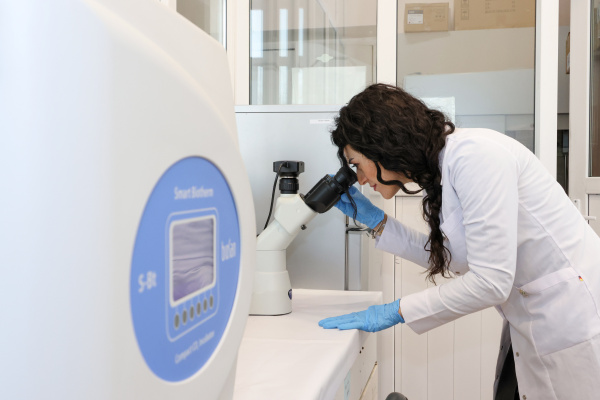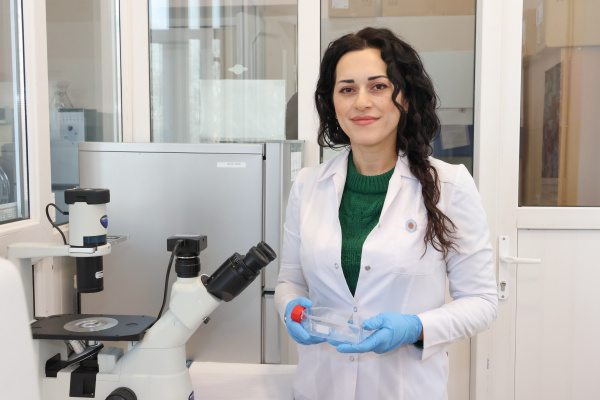September 17, 2024 | 10:55
Science
Research
Publications and scientific journals
YSU researcher leads scientific project aimed at overcoming cancer
Hayarpi Javrushyan, a researcher at the YSU Biology Research Institute, is among the few scientists whose project received funding under the "Program for the Advancement of Women Leaders-2024" competition, announced by the RA Ministry of Education, Science, Culture, and Sports (MoESCS). Her scientific project aims to uncover the role of hypoxia in cancer treatment and to elucidate the mechanisms underlying its development.

The studies are being conducted in the Basic and Pathological Biochemistry Laboratory at YSU and will last approximately three years. During this period, the researcher will examine the impact of mild hypoxia on breast cancer treatment. Hayarpi Javrushyan discussed her chosen topic, "Intermittent Hypoxia as a Method for Overcoming Drug Resistance in Breast Cancer Treatment," addressing the core challenges in cancer treatment and presenting her approach to overcoming these issues.
The Development of an Anti-Cancer Therapeutic Model: The Focus of YSU Researcher's Attention
The Basic and Pathological Biochemistry Laboratory focuses on investigating the molecular mechanisms during cancer, type 2 diabetes, and hypoxia, including the cardiovascular complications associated with these conditions. Since 2018, our scientific group has been dedicated to developing an anti-cancer therapeutic model. We have utilized blood samples from female patients with breast cancer, animal models, and cancer cell lines in our research.
Starting in 2020, we were awarded a grant through the Higher Education and Science Committee of the RA MoESCS, first for initiating scientific groups and subsequently for strengthening these groups (laboratories). Then I decided to create my own team to explore the role of hypoxia in cancer and its development mechanisms as part of our laboratory’s ongoing research efforts.

Development of Drug Resistance During Cancer Treatment
Hypoxia, or a lack of oxygen in the tissues, can lead to harmful effects, exacerbate tissue decay, and contribute to the development of certain diseases. While chronic or severe hypoxia can have devastating effects on cells, adaptive mechanisms in response to hypoxia can offer protection in various conditions. Cancer, which causes millions of deaths worldwide, presents a major challenge with the development of drug resistance during treatment. This resistance not only prevents the effective destruction of tumor cells, but can also damage surrounding healthy tissues. A key factor contributing to this issue is the metabolic disorders caused by hypoxia within the tumor microenvironment.
Mild Hypoxia as a Cancer Treatment
Another important reason for selecting this topic is that my PhD research was directly related to hypoxia. Hypoxia is a pathological condition observed not only in cancer but also in various diseases such as cardiovascular diseases, asthma, anemia, and stroke. Some research suggests that mild hypoxia can promote healthy angiogenesis. We hypothesize that this healthy angiogenesis might enhance drug delivery to deeper layers of tumors, potentially overcoming drug resistance. Essentially, we aim to use the tumor’s own mechanism against itself. However, the molecular mechanisms underlying hypoxia and its effects on cancer are not yet fully elucidated.
This project will investigate how mild hypoxia influences the reduction of resistance to various chemotherapeutic compounds in an experimental breast cancer model, with a focus on the hypoxia-inducible factor 1 (HIF-1) pathway.
Involvement of PhD, Master’s, and Upper-Year Bachelor’s Students in Research
The team comprises four other laboratory employees, including two PhD students who actively participate in various international conferences. I have collaborated with my teammates for a long period. While we each bring diverse perspectives and solutions to problem-solving, we come together with a unified goal when making important decisions. Additionally, master's and upper-year bachelor's students will also play an active role in the research.

Building New Scientific Ties Through Research
Most of the experimental work will be conducted in the Basic and Pathological Biochemistry Laboratory at the YSU Biology Faculty. Additionally, we will analyze samples in the laboratories of the Chairs of Human and Animal Physiology, and Genetics and Cytology. We also plan mutual visits with our project’s foreign consultant, Professor Alina Maloyan, who specializes in developmental programming, and studies type 2 diabetes, obesity, and metabolism. Our team has already collaborated with Professor Maloyan on four joint publications in high-ranking journals. We will visit the OHSU's Maloyan Lab in Oregon, USA. Despite the brief duration of the visit, we anticipate gaining insights into modern methods and equipment, and establishing new connections. These connections could serve as a foundation for future foreign training opportunities for our PhD students.
Scientific Articles as Summaries of Research Findings
We plan to publish three scientific articles and one review article. Depending on the data, this number may change, and more articles may be published. In addition to these publications, laboratory staff and students actively involved in the research will present their findings at local and international conferences. The dynamic nature of research fosters the generation of new ideas, the establishment of new connections, and the emergence of innovative research concepts. This process underscores the interest of science.

